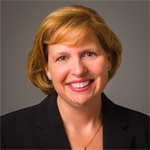A: It’s very exciting. One of those people, when he was looking for a job, told a doctor at the Cleveland Clinic, ‘I want to be just like Dr. Brasington.’ I thought that was rather touching.
Q: Does that tell you you’ve done your job?
A: I see my job as helping [fellows] learn and helping them find a way to do what they want to do. And they want to do a lot of different things. One of the things I cherish the most is I really think I’ve trained them to think for themselves. A good example of that is in January [2015], I was out for six weeks with back surgery. One of my senior fellows and one of the junior faculty that had just been a fellow took care of my patients, and they did something completely different than what I would have done. I was actually pleased that they were willing to think for themselves.
Q: Why do you believe you’ve been successful?
A: When you have a chance to do something that you have a passion for and you are naturally good at, it’s very, very easy to succeed. But it wasn’t until the age of 45, 20 years after I started medical school, that I actually got a chance to do what I wanted to do. It’s one reason that when I got to Washington University in 1996, I just hit the ground running. It was like, ‘Man, I’ve been wanting to do this for a long time.’
ACR Distinguished Fellowship Program Director Award
 Beth Jonas, MD, Associate Professor of Medicine/Rheumatology and Director, Rheumatology Fellowship Training Program, Thurston Arthritis Research Center, University of North Carolina, Chapel Hill, N.C.
Beth Jonas, MD, Associate Professor of Medicine/Rheumatology and Director, Rheumatology Fellowship Training Program, Thurston Arthritis Research Center, University of North Carolina, Chapel Hill, N.C.
Background: Teaching is in Dr. Jonas’ DNA, both literally and figuratively. Her father and sister are both teachers, so the intersection of academia and rheumatology was a natural career choice that quickly solidified when she was tapped as chief resident at the George Washington University in Washington, D.C.
“I really enjoyed that year of interacting with junior residents and students,” Dr. Jonas says. “It really put the bug in my bonnet about teaching and about sharing my interest and expertise.”
She’s been doing it ever since, and has led the rheumatology program at UNC since 2001. She’s also a founding member of Carolinas Fellows Collaborative, which aims to develop educational protests for rheumatology fellows across North and South Carolina.



